Q-Space Read online
Page 19
“To their eyes, we look as they do,” Q explained. He drained the last of his drink, then refilled the cup simply by looking at it. “Given your own limited ability to adapt to new forms, I’m letting you stick with the persona you’re accustomed to. I hope you appreciate my consideration.”
“But this is what the ancient Taguans looked like?” Picard asked, gesturing at the crowds swarming over the cliff face.
“Actually, they called themselves the Imotru,” Q stated, “but, yes, this is no illusion or metaphor. Aside from you and I, you’re seeing things exactly as they were.” Q’s face remolded itself until he looked like another Imotru. Only the mischievous glint in his eyes remained the same. “See what I mean?” He blinked, and his customary features returned.
The peal of an enormous gong rang across the night, and a hush fell over the scene as the buzz of countless conversations fell silent. Picard could feel a sense of acute expectation come over the scene, drawing him back to the railing overlooking the great lake. Something was obviously about to happen; the teeming throng of Imotru assembled along the cliff were waiting eagerly for whatever was to come.
A spark of light way down upon the surface of the lagoon caught his attention. Picard heard a hundred mouths gasp in anticipation. A moment later, a string of torches ignited above the black, moonlit water, their flames reflected in a series of mirrors arranged around the torches, which formed a hexagonal pattern, cordoning off an open stretch of water, about seventy meters across, in the direct center of the dark lake. The polished mirrors reflected the light inward so that this single swatch of rippling water was illuminated as if by the afternoon sun, while the rest of the lagoon remained cast in shadow. A single swimmer, holding aloft the glowing brand she must have used to light the torches, floated amid the brightly lit pool she had created. With a dramatic flourish, she doused the brand to a smattering of cheers and stamping feet.
Was that it? Picard thought, peering down at the lighted hexagon demarcated by the torches and mirrors. Based on the crowd’s reaction, he suspected not. There was still that keen sense of anticipation in the air, an almost palpable atmosphere of mounting excitement. Somehow he knew that what he had just witnessed was merely a prelude, not the main event.
Most of the assembled Imotru, he observed, were now looking upward, eagerly searching the moonlit sky for…what? An image from an ancient jade bas-relief, meticulously reproduced in the Federation database, popped into his head just as a thrilling possibility presented itself. No, he thought, disbelieving his own good fortune, surely we couldn’t have arrived in time for that!
A roar rose from the crowd. Dozens of seated Imotru leaped to their feet, including Q, who joined Picard by the railing. “Look up, Jean-Luc,” he whispered. “Here they come.”
Picard needed no urging. He strained his eyes to spot the sight that had electrified the assemblage, the sight whose true nature he could scarcely bring himself to believe. It must be them, he thought. It couldn’t be anything else, not here in this place and time.
Sure enough, his eyes soon discerned a flock of winged figures on the horizon, soaring toward them. The Imotru cheered and stomped their feet so heavily that Picard feared for the safety of the jade balconies, even though he knew that some of them had endured even into the twenty-fourth century. He found himself stamping his own boots, caught up in the fervor of the crowd. The winged figures drew ever nearer, much to the delight of the onlookers upon the cliff. “They’ve been gliding for two full days,” Q commented, “since taking flight from the peak of Mount T’kwll.”
Picard no longer doubted what he was about to behold. He could only marvel at the amazing twist of fate that had granted him this unparalleled chance to see a timeworn legend made flesh. “The fabled Sky Divers of Tagus III,” he whispered, his voice hushed. If this was no mere trick of Q’s, then he was about to make the most astounding archaeological discovery since Benjamin Sisko found the lost city of B’hala on Bajor.
Within moments, the fliers were near enough that he could see that, as he had hoped, they were in fact dozens of youthful Imotru men and women, borne aloft by artificial wings strapped to their outstretched arms. Silver and gold metallic streamers trailed from their wrists and ankles, sparkling in the moonlight. Were the wings made of some unusual gravity-resistant substance, Picard wondered, or were the Imotru lighter than they appeared, perhaps gifted with hollow bones like birds? Either way, they presented a spectacular sight, silhouetted against the twin moons or glittering in the night like humanoid kites.
The Sky Divers soared overhead, swooping and gliding in complex feats of aerial choreography. Each flier, he saw, gripped a shining blade in one hand, just as they did on the fragmentary bas-relief Picard now recalled so well. Despite the graceful ballet taking place above, his gaze was invariably drawn back to the dark waters at the base of the cliff—and the lighted regions within the radiance of the torches and mirrors. He felt his heart pounding, knowing what had to come next. His eyes probed the rippling surface of the lake, hunting for some sign of what lurked beneath. Perhaps that part of the legend is just a myth, he thought, unsure whether to feel disappointed or relieved. Professor Galen, he recalled, had theorized that the Sky Divers were no more than a symbolic representation of cultural growth and entropy.
Then it began. A single flier, chosen through some process Picard could only guess at, used his silver blade to sever the straps binding him to his wings while the crowd below bellowed its approval. The shed wings drifted away aimlessly, slowly spiraling down like falling leaves, as the young Imotru plunged toward the water below with frightening speed.
Trailing golden ribbons behind him, the diver splashed headfirst into the lake below, landing squarely within the brightly lit boundaries of the hexagon. On a hundred balconies, Imotru whooped and stamped wildly. Things had clearly gotten off to a good start as far as the crowd was concerned. Down in the hexagon, the triumphant diver kicked to the surface and impulsively embraced the lone swimmer who had waited there. His joy and exuberance were obvious to Picard even from more than a kilometer away.
One by one, following some prearranged signal or sequence, more gliders fell from the sky. The second diver used her arms and legs to guide her descent, also landing safely within the torch-lit target zone. The audience cheered again, although slightly less wholeheartedly than they had before. Still, the woman joined the other two Imotru in their celebration, splashing happily within the golden glow of reflected light.
The third diver looked less fortunate, his downward trajectory carrying him away from the charmed hexagon. Too late, he threw out his arms and legs, striving to alter his course, but his efforts were in vain. The entire crowd held its breath, and, for a second or two, Picard feared the young man would be scorched by the dancing flames of the torches.
Before he came within reach of the flames, however, an enormous serpentine head broke the surface of the black waters and snapped at the falling youth. Water streamed off its scaly hide and a slitted yellow eye fixed on the falling youth. A forked, sinuous tongue, larger than a man’s arm, flicked at the sky. Ivory fangs flashed in the moonlight and Picard saw a splash of azure blood burst from the diver before both predator and prey disappeared beneath the waves churned up by the creature’s shocking appearance.
Just like on the jade artifact, Picard thought, saddened but not too surprised by what had transpired. Apparently the myth of the Sky Divers was all too true, up to and including the Teeth of the Depths. So much for mere symbolic interpretations, he thought.
And still the gliders cut their wings free, undeterred by the grisly fate of their cohort. Toward the waiting lake they dropped like Icarus, some attempting to steer their falls, others simply trusting to fate. Looking carefully, Picard saw more reptilian heads rising from the murky waters outside the protective torches, drawn no doubt by the scent of blood and the splashing of the defenseless bodies. Only within the illuminated hexagon did the divers appear to be safe. Those who hit the
water within its confines floated merrily, crowing and cavorting as only those who have barely escaped death can rejoice. Those who plummeted beyond the light of the torches were quickly dragged under by the voracious predators.
“The trick,” Q said casually, as though discussing some minor athletic competition, “is to miss the flames and the snapping jaws. The faster the fall, the greater the risk—and the glory.” He applauded softly, whether for the divers or the serpents Picard was afraid to guess. “Like I told you a few years back, they really knew how to have fun here back in the good old days.” Wandering back toward the table, Q plucked a strip of raw meat from the copper plate and tossed it over the edge of the balcony. As Picard watched aghast, similar scraps flew from balconies all around him, so it looked like it was raining blue, bleeding strips of meat. “The treats are to distract the snakes from the divers,” Q explained, “or to incite the snakes to an even greater frenzy. I can’t remember which.”
Rather than watch the fierce serpents claim their prey, Picard focused on the jubilant survivors within the hexagon. “They’re safe now,” he said, “but how will they escape from the lake?”
“Oh, the snakes are strictly nocturnal,” Q told him. “They’ll be able to swim to shore in the morning, after what will undoubtedly be the greatest night of their lives.”
Picard was unable to tear his gaze away from the barbaric spectacle. Before his eyes, what seemed like an unending string of young people gambled with their lives, some joining the riotous celebration within the six-sided sanctuary, others torn asunder by the hungry serpents. To cope with the awful and awe-inspiring pageant, he forced himself to think like an archaeologist. “What is this?” he asked. “A religious sacrifice? An initiation rite? A means of population control?” Turning away from the rail, he confronted Q. “What in heaven’s name is the purpose of this appalling display?”
“Don’t be so stuffy, Jean-Luc,” Q said, offering Picard a strip of meat dripping with blue gore. Picard refused to even look at the edible. With a sigh, Q tossed it off the balcony himself. “They do it for the thrill. For the sheer excitement. It’s all in fun.”
Picard tried to grasp the notion. “You’re saying this is simply some form of sports or theater? A type of public entertainment?”
“Now you’re getting closer,” Q confirmed. “Think of the matadors or bull dancers of your own meager history. Or the ’Iwghargh rituals of the Klingons. With a slightly higher body count, of course.”
It was almost too much to digest. Deep in thought, Picard pulled out a chair and sat down opposite Q. “This is fascinating, I admit, and, you’re right, no worse than various bloodthirsty chapters of early human history. The gladiatorial violence of the Roman coliseums, say, or the human sacrifices of the ancient Aztecs. I can’t say I regret having viewed this event. Still, seeing it in person, it’s hard not to be appalled by the profligate waste of life.”
“But you short-lived mortals have always taken the most extraordinary and foolish risks to your brief existences,” Q said. “Diving off cliffs, performing trapeze acts without a net, flying fragile starships into the galactic barrier…”
Q’s coy reference to the Enterprise jolted Picard, yanking the status of his ship back into the forefront of his consciousness. Never mind this timelost scenario, what was happening to Riker and his crew back in his own era, and how soon was this game of Q’s likely to end? “Is that why we’re here?” he asked, thinking that perhaps he had seen through Q’s current agenda. “It seems rather a roundabout way to make your point.”
“If only it were that easy,” Q replied, “but that diverting little entertainment out there is far from the most important event transpiring at this particular moment in time. Permit me to call your attention to that individual dining on that balcony over there.” Q pointed past Picard at a jade outcropping located several meters to the left, where he saw a solitary Imotru watch in fascination as the Sky Divers tempted fate with their death-defying descents. “Recognize him?”
What? Q’s question puzzled Picard. How could he be expected to recognize a being who had died billions of years before he was born? “He’s Imotru, obviously, but beyond that I don’t see anything familiar about him.”
Q looked exasperated. “Really, Picard, you can be astonishingly dim sometimes.” He rolled up his sleeves and extended both hands toward the figure on the other balcony. He wiggled his fingers as if casting a spell. “Perhaps this will make things easier.”
Wavy brown hair sprouted from the Imotru’s shining skull, but he appeared not to notice. His features remolded themselves, becoming more human in appearance, even as he continued to observe the divers as if nothing were happening. His eyebrows darkened, his lips grew more pronounced, until Picard found himself staring at a very familiar acquaintance, albeit one still clad in Imotru garb. “It’s you,” he said to Q. “You were disguised as an Imotru.”
“I’m disguised every time we meet,” Q pointed out. “Surely, you understand that my true form no more resembles a human being than it does an Imotru.”
So we’re still exploring Q’s own past, Picard realized. Examining the scene, he saw that the other Q looked noticeably younger than the Q who had brought him here, although not nearly as youthful as the boyish Q who had toyed with antimatter in the micro-universe. This Q had left adolescence behind and seemed in the first full flush of adulthood, however those terms applied to entities such as Q. He appeared utterly riveted by the grisly extravaganza put on by the Imotru, lifting a scrap of blue meat from his plate and nibbling on it experimentally while his eyes tracked each and every plunge. The expression on his face, Picard discerned, looked wistful and faintly envious.
“This was the first time I had ever seen anything like this,” the older Q said, “but not the last. I came every year for millennia, until their civilization crumbled, the Imotru gradually succumbed to extinction, and the Sky Divers became nothing more than a half-forgotten myth.” He watched himself watching the divers. “But it was never quite the same.”
“Did you always come alone?” Picard asked. It occurred to him how seldom the young Q seemed to interact with others of his kind. When I was his age, relatively speaking, he thought, I thrived on the company of my friends: Marta, Cortin, Jenice, Jack Crusher…
“Funny you should mention that, Jean-Luc,” Q responded, throwing their last shred of blue meat to the serpents. He snapped his fingers and both he and Picard were gone before the bloody scrap even reached the water.
Interlude
The red alert alarms did not go off in the guest quarters, so as not to panic unnecessarily any civilian passengers, but Milo Faal did not need to see any flashing colored lights to know that something was happening. He could sense the tension in the minds of the crew, as he could see the raging plasma storm outside his window and feel the tremors every time the thunder boomed around them.
Milo did his best not to look or think afraid in front of his little sister. Kinya was too young to understand all that was occurring. The little girl stood on her tiptoes, her nose and palms glued to the transparent window, captivated by the spectacular show of light and sound. Milo couldn’t look away from the storm, either. He stood behind Kinya with one hand on the arm of a chair and the other one on his sister’s shoulder, just in case she lost her balance, while he tried to figure out what was going on.
Most of the crew members whose thoughts he latched on to did not know much more than he did about the churning cloud outside, but he got the idea from some of them that the cloud was actually alive. Did that mean the storm was shaking them around on purpose? He could not repress a shudder at the thought, which transferred itself empathically to Kinya’s tiny frame, which began to tremble on its own, even if the little girl was not consciously aware of the source of the anxiety. “Milo,” she asked, looking back over her shoulder, “what’s wrong?”
“Nothing,” he fibbed, but another sudden lurch said otherwise. A half-completed jigsaw puzzle, featuring a str
iking illustration of a Klingon bird-of-prey, slid off a nearby end table, the plastic pieces spilling onto the carpet. Milo had spent close to an hour working on the puzzle, but he barely noticed the undoing of his efforts. He had more important things to worry about.
Where are you, Dad? he called out telepathically. Lightning flashed on the other side of the window, throwing a harsh glare over the living room. Dad? he called again, but his father might as well have been back on Betazed for all the good it did.
Taking Kinya by the hand, and stretching his other arm out in front of him to break any falls, he led her across the living room toward the suite’s only exit. If his father would not come to them, he thought, then he was getting pretty tempted to go find their dad. The Enterprise was a huge ship, he knew, but it couldn’t be too hard to locate Engineering, could it? Anything was better than just sitting around in the quaking guest quarters, wondering what to do next.
He and Kinya approached the double doors leading outside, but the heavy metal sheets refused to slide apart. “Warning,” the voice of the ship’s computer said. “Passengers are requested to stay within their quarters until further notice. In the event of an emergency, you will be notified where to proceed.”
Milo stared in disbelief at the frozen doors. In the event of an emergency…? He glanced back at the seething mass of destructive plasma pounding against the hull. If this wasn’t an emergency, then what in the name of the Sacred Chalice was it? And how come Dad wasn’t stuck here, too?
“Dad?” Kinya picked up on his thoughts. “Where’s Daddy, Milo?”
I wish I knew, he thought.
Fourteen

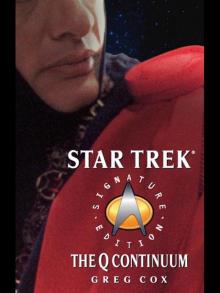 Q-Space
Q-Space Godzilla - the Official Movie Novelization
Godzilla - the Official Movie Novelization War for the Planet of the Apes: Official Movie Novelization
War for the Planet of the Apes: Official Movie Novelization Underworld: Evolution
Underworld: Evolution Underworld
Underworld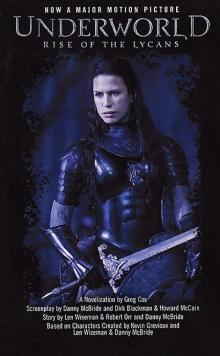 Rise of the Lycans
Rise of the Lycans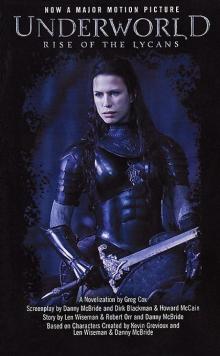 04 - Rise of the Lycans
04 - Rise of the Lycans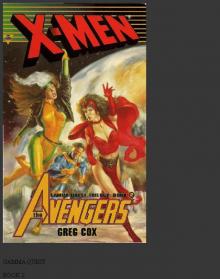 X-Men and the Avengers: Search and Rescue
X-Men and the Avengers: Search and Rescue Child of Two Worlds
Child of Two Worlds Welcome to Promise City
Welcome to Promise City The Librarians and the Mother Goose Chase
The Librarians and the Mother Goose Chase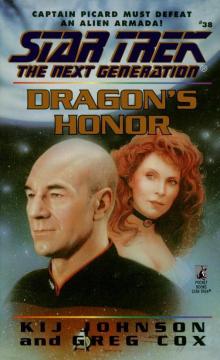 Dragon's Honor
Dragon's Honor 03 - Evolution
03 - Evolution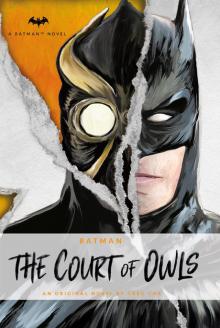 DC Comics novels--Batman
DC Comics novels--Batman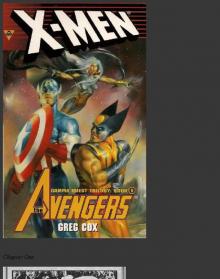 X-Men and the Avengers: Lost and Found
X-Men and the Avengers: Lost and Found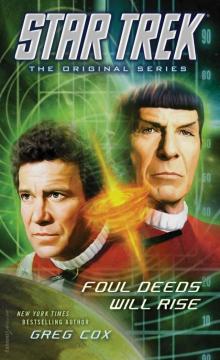 Foul Deeds Will Rise
Foul Deeds Will Rise 02 - Blood Enemy
02 - Blood Enemy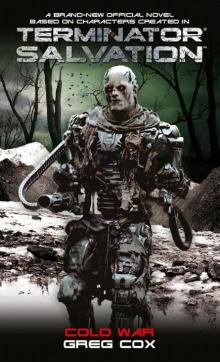 Terminator Salvation: Cold War
Terminator Salvation: Cold War The Weight of Worlds
The Weight of Worlds The Antares Maelstrom
The Antares Maelstrom Warehouse 13: A Touch of Fever
Warehouse 13: A Touch of Fever Underworld: Blood Enemy
Underworld: Blood Enemy The Rise and Fall of Khan Noonien Singh
The Rise and Fall of Khan Noonien Singh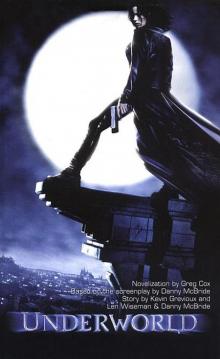 01 - Underworld
01 - Underworld The 4400- the Vesuvius Prophecy
The 4400- the Vesuvius Prophecy Assignment: Eternity
Assignment: Eternity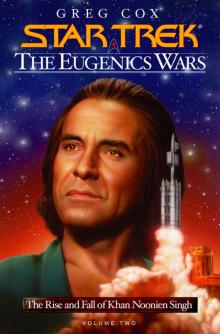 The Eugenics Wars, Vol. 2: The Rise and Fall of Khan Noonien Singh
The Eugenics Wars, Vol. 2: The Rise and Fall of Khan Noonien Singh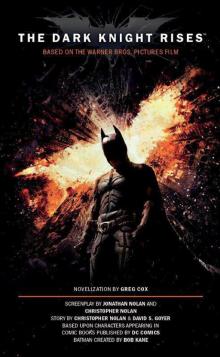 The Dark Knight Rises: The Official Novelization
The Dark Knight Rises: The Official Novelization The Bestseller Job
The Bestseller Job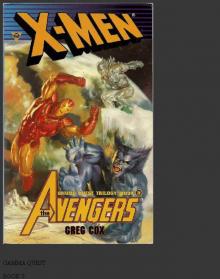 X-Men and the Avengers: Friend or Foe?
X-Men and the Avengers: Friend or Foe?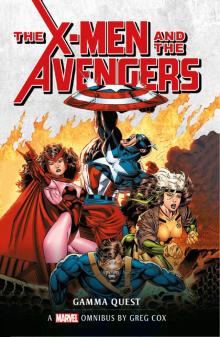 Marvel Classic Novels--X-Men and the Avengers
Marvel Classic Novels--X-Men and the Avengers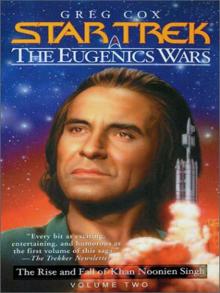 STAR TREK: TOS - The Eugenics Wars, Volume Two
STAR TREK: TOS - The Eugenics Wars, Volume Two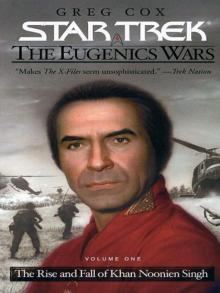 STAR TREK: TOS - The Eugenics Wars, Volume One
STAR TREK: TOS - The Eugenics Wars, Volume One The Black Shore
The Black Shore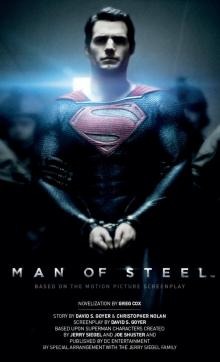 Man of Steel: The Official Movie Novelization
Man of Steel: The Official Movie Novelization Loose ends r-1
Loose ends r-1 Legacies
Legacies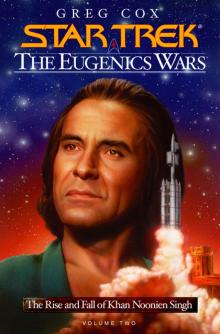 The Eugenics Wars, Volume Two
The Eugenics Wars, Volume Two Star Trek: The Original Series - 148 - The Weight of Worlds
Star Trek: The Original Series - 148 - The Weight of Worlds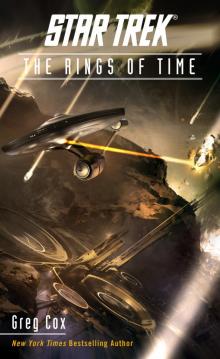 Star Trek: The Original Series: The Rings of Time
Star Trek: The Original Series: The Rings of Time Godzilla--The Official Movie Novelization
Godzilla--The Official Movie Novelization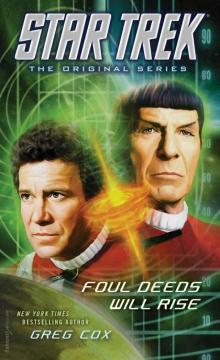 Star Trek: The Original Series - 160 - Foul Deeds Will Rise
Star Trek: The Original Series - 160 - Foul Deeds Will Rise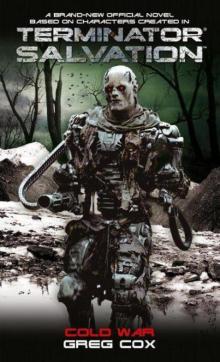 Terminator Salvation: Cold War ts-3
Terminator Salvation: Cold War ts-3 Star Trek: The Original Series: Miasma
Star Trek: The Original Series: Miasma Star Trek: The Original Series: No Time Like the Past
Star Trek: The Original Series: No Time Like the Past Child of Two Worlds (Star Trek: The Original Series)
Child of Two Worlds (Star Trek: The Original Series) THE 4400® WELCOME TO PROMISE CITY
THE 4400® WELCOME TO PROMISE CITY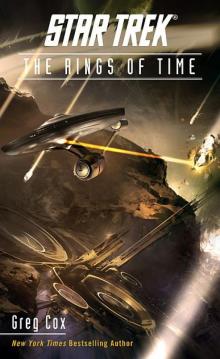 Star Trek: The Original Series: The Rings of Time (star trek: the original series)
Star Trek: The Original Series: The Rings of Time (star trek: the original series) To Reign in Hell: The Exile of Khan Noonien Singh
To Reign in Hell: The Exile of Khan Noonien Singh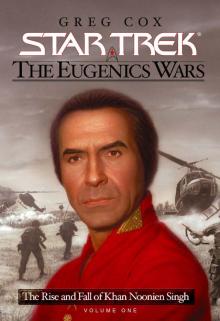 Star Trek: The Eugenics War, Vol. 1
Star Trek: The Eugenics War, Vol. 1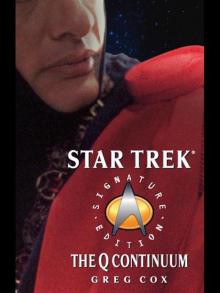 The Q Continuum
The Q Continuum